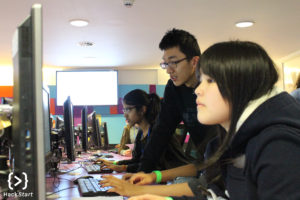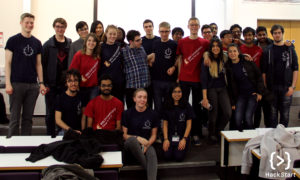![]() This guest post by Vicky Dineshchandra, third year Computer Science student and former vice-president of the Technology Society at UCL, was sponsored by UCL Engineering.
This guest post by Vicky Dineshchandra, third year Computer Science student and former vice-president of the Technology Society at UCL, was sponsored by UCL Engineering.
It’s wonderful to see the work being done to inspire younger children to take up STEM subjects. A wide range of people contribute to these programmes: academics, industry professionals, and parents, but I want to focus on a lesser known group that has the potential to connect with younger children on a more personal level, motivating them to pursue STEM at higher levels — university students.

A recent survey from Emerson found that “many young people in the US are avoiding science, technology, engineering and mathematics (STEM) education because they don’t understand the opportunities”. We also know that girls in particular are drawn to careers that have social worth. But the social worth of STEM is often poorly communicated, and that is a challenge that must be met to attract more girls to STEM careers.
University students are perfectly placed to inspire children stuck in the classroom who are perhaps unable to see past the equations, and have yet to be convinced of the potential impact of what they are learning. They are able to better relate to school-age children and understand their concerns, not least because they probably have experienced similar concerns themselves and found a way to overcome them.
As a second year computer science student at University College London (UCL) and a vice-president of the UCLU Technology Society (TechSoc), I have tried to tap into the enthusiasm of my fellow students and use that to inspire the next generation. I believe the Society has made huge amounts of progress in reaching out to children by mobilising the undergraduate student body, and I’d like to share my experience, in hope that other student bodies around the country can do the same.
For university students to volunteer their time and energy, it’s important to make them feel part of a community. We were able to do this through TechSoc, and we ran many events, hackathons and student-led projects to help develop a cohesive tech community. Students were made to feel comfortable (especially first years) and everyone was encouraged to share and contribute.
The engineering faculty at UCL ran many outreach events at schools and at the university, such as CoderDojo, with overwhelmingly positive support from the TechSoc community. This was largely due to the fact we had already established a base community; because students appreciated the events we ran for them, they reciprocated and wanted to give back, volunteering their time for children. As a result, we decided to start a TechSoc Volunteering Crew, which now has 110+ members. We found that people were always willing to help, and that entrusting them to run a small event or give a talk also helped to develop their confidence.
Around the same time, at the start of the second term, the first year students were about to start their Coding Curriculum projects, a course which encourages students to create computer science teaching material for younger students. TechSoc gave a short talk on why it’s important that they incorporate their prior experiences so that the material they produce is effective and engaging.
 You can see the passion students invested in their work, and the richness in the quality of the projects that emerged as a result of them understanding the importance of outreach. It didn’t stop there; about 30 first year students went on to organise HackStart, a day of inspirational talks, tech demos and workshops to get young children interested in computer science. Every workshop, talk or demo presenter emphasised an aspect of computer science that was really special to them and why they studied it. Younger children were able to see past those equations and see something real in the world of STEM, not anecdotes from their teachers or parents, but experiences of someone closer in age whom they could aspire to be like in a couple of years’ time. This is the biggest value university students can bring to outreach events.
You can see the passion students invested in their work, and the richness in the quality of the projects that emerged as a result of them understanding the importance of outreach. It didn’t stop there; about 30 first year students went on to organise HackStart, a day of inspirational talks, tech demos and workshops to get young children interested in computer science. Every workshop, talk or demo presenter emphasised an aspect of computer science that was really special to them and why they studied it. Younger children were able to see past those equations and see something real in the world of STEM, not anecdotes from their teachers or parents, but experiences of someone closer in age whom they could aspire to be like in a couple of years’ time. This is the biggest value university students can bring to outreach events.
This is just the first year of the TechSoc Volunteering Crew, and the society has larger plans to make use of our technical skills, small age gap and passion for STEM to help a wider range of younger children, particularly those who are from underrepresented groups. Encouraging university students to engage with schools outreach projects has proven beneficial for both them and for the school children they have worked with, and it is a scheme that I hope can be replicated at other universities.